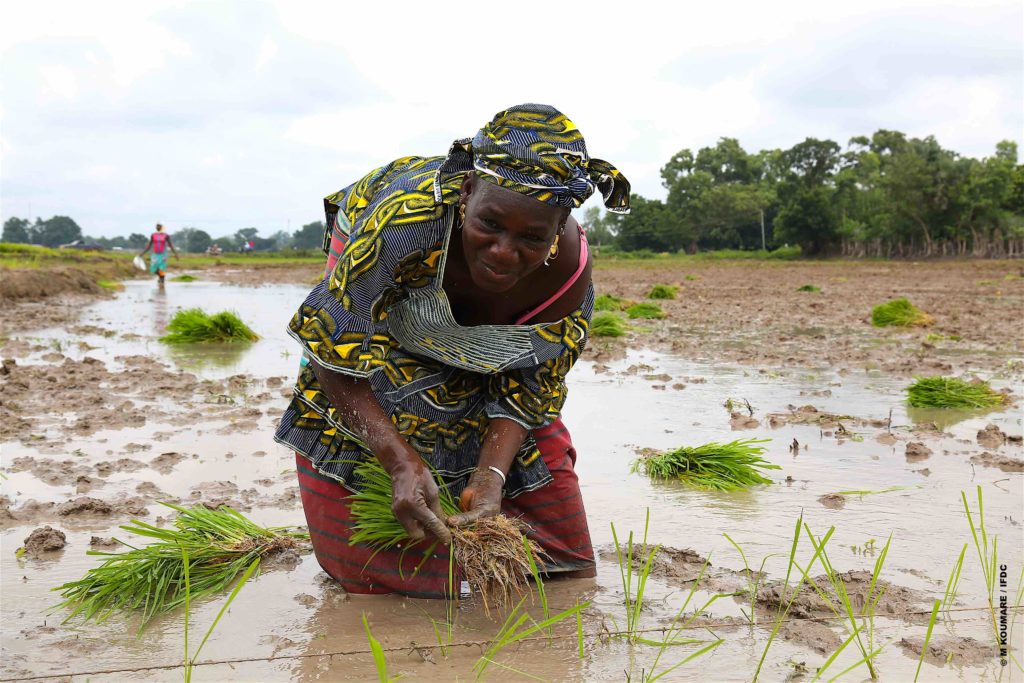
The TAAT program’s goal is to radically transform African subsistence-based agriculture to agriculture as entrepreneurship and business to support the “Feed Africa” pillar of the African Development Bank’s agricultural development strategy. TAAT is increasing agricultural productivity in Africa through the deployment of proven and high-performance agricultural technologies at scale along selected value chains, such as rice, maize, cassava, wheat, sorghum, millet, orange-flesh sweet potato, high-iron beans, livestock, and aquaculture. TAAT operates as a network of interacting “compacts,” with nine devoted to specific commodity value chains and six serving as “enablers” that provide specialist services, such as soil fertility, water management, capacity building, youth, policy, and fall armyworm control.
The TAAT program is funded by the African Development Bank from 2018 to 2021.
IFDC’s role is to lead the TAAT Soil Fertility Enabler (SFE), which is scaling up agricultural input-based technologies for accelerated productivity growth, resilience, and improved livelihoods.
The TAAT: Soil Fertility Enabler component is scaling up agricultural input-based technologies for accelerated productivity growth, resilience, and improved livelihoods.
SFE Objectives
- Facilitate a responsive private sector-led input delivery system to support the scaling up of agricultural input-based technologies. Mandated by the ECOWAS Commission and working with CORAF/PAIRED in harmonizing the seed and fertilizer sectors, IFDC will use this opportunity to accelerate implementation of the harmonized regional regulations on fertilizer trade and quality control. Development and strengthening of national capacity will be done by organizing training of fertilizer inspectors on regulations, quality control, and subsidy programs with available materials at IFDC. This will lead to the development of policy briefs aiming to remove major bottlenecks in the agro-input delivery system in collaboration with AATF policy and CORAF.
- Establishment of Regional Technology Delivery Infrastructure. The main activity planned in this component is the organization of two regional workshops (Anglophone and Francophone) on Training of Trainers (ToT) of agro-dealers and step-down trainings to reach a critical mass across 21 countries. Education and technology promotion materials are tailored for the seven target value chains. Digitization of training is used to accelerate scaling of training materials. In order to reach the desired scale, youth will be involved, in collaboration with TAAT ENABLE-Youth, in the step-down training.
- Deployment of Transformative Agro-Input Technologies. The Soil testing, Mapping, Recommendations development, and Technology transfer (Soil SMaRT) approach and microdosing and urea deep placement fertilizer technologies are being deployed. SFE applies the principle of the 4Rs of fertilizer use (right source, right rate, right time, and right place), which will be included in toolkits along with compacts’ seed-based technologies for better crop harvest. In partnership with compacts, SFE will develop and distribute innovative and targeted communication materials to sensitize farmers on the technologies.
Results
2021
- Facilitated the registration of 2,451 agro-input dealers in the target countries.
- Established an electronic platform in Burkina Faso that links farmers to agro-input dealers to facilitate last-mile delivery of fertilizers.
- Established 888 demonstration plots on fertilizer technologies, including urea deep placement, microdosing, and integrated soil fertility management (ISFM) and trained 604 stakeholders on ISFM and related skills.
- Produced 62 soil fertility maps to guide fertilizer recommendations.
- Tested 13 fertilizer formulas in farmers’ fields.
- Distributed 1,130 mini-kits (seed + fertilizer) to farmers for their own testing of fertilizer microdosing.
2020
- With a network of 33 partners including the national agricultural research system (NARS) and the private sector, registered 2,451 agro-input dealers in Burkina Faso and established a platform linking farmers to agro-input dealers, facilitating last-mile delivery of fertilizers.
- Demonstrated 463 fertilizer technologies, including urea deep placement, microdosing, and ISFM.
- Trained 492 farmers in the fundamentals of ISFM.
- Produced 34 soil fertility maps to guide fertilizer recommendations.
- Distributed 1,130 mini-kits (seed + fertilizer) for farmers’ own testing of microdosing.
- Tested 13 fertilizers in farmers’ fields.
2019
- A survey of key stakeholders of the fertilizer industry was conducted in Nigeria to identify major bottlenecks in the agricultural input delivery systems.
- Mapping of agro-input dealers has been implemented in Burkina Faso, Mali, and Nigeria.
- Terms of Reference (ToR) and Request for Expression of Interest (REOI) were submitted to the African Development Bank for approval to conduct regional training of agro-input dealers in 21 African countries.
- In collaboration with National Agricultural Research Systems (NARSs) in Benin, Burkina Faso, Mali, and Nigeria, site-specific fertilizer formulations are being implemented for crops using the Soil SMaRT approach. 1,697 georeferenced soil samples were collected in each country for analysis to map soil nutrient deficiencies.
- Three subcontracts were signed with partners for conducting analysis of soil samples from Nigeria, producing soil fertility maps of Tanzania, and scaling up balanced fertilizer on cassava, sweat potato, and maize and UDP on rice.
- In collaboration with NARS and private extension service providers, fertilizer efficient technologies, mainly microdosing (MD) and UDP, are being demonstrated, and videos are being produced on the fundamentals of fertilizer deep placement, MD, and integrated soil fertility management for wheat, maize, rice, and cassava.
